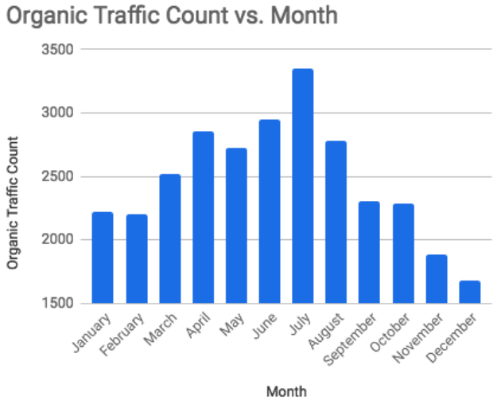When Should Multifamily Operators Start to Worry about Their Occupancy?

How do you feel about your occupancy?
If your community follows typical seasonality patterns, you probably feel good about your occupancy.
If your occupancy isn’t where you’d expect it to be as we head into the slower leasing season, don’t panic…yet.
In this blog:
- How do I know if I should be concerned about my community’s occupancy?
- What’s coming down the road for multifamily, and how that impacts your current situation.
- Actionable steps to quickly improve occupancy before things take a turn.
How do I know if I should be concerned about my community’s occupancy?
Start by looking at the amount of organic traffic to your community website.
Organic traffic counts individuals who visited your community website via a non-paid source (like searching for your community by name in Google). When someone takes this action, they’re further along in their search for an apartment, which makes organic traffic an excellent way to measure your actual demand.
For many communities, organic traffic peaks during the summer months before tailing off again around the start of the school year and through winter. These changes in demand reflect your apartment community’s seasonality like this:

By comparing last year’s monthly organic traffic numbers to this year’s, you can track where your demand has been historically for this time of year and whether or not it could be a problem.
But you also need to know where demand stacks up against supply, so review the leases expiring over the next couple of months to get an expectation of your leasing needs heading into winter, too.
If you’ve got more supply coming, and your demand isn’t matching your historical seasonality patterns, you should worry about your community’s occupancy now and going forward because leasing units will become significantly more complex as fewer renters move during the winter.
And multifamily forecasters say that challenge will only become more complicated.
Multifamily projections indicate trouble ahead
Jordan Brooks with ALN Apartment Data lays out three significant challenges facing the multifamily industry as we shift toward the slower leasing season:
- The national average occupancy has fallen by 1.5% in the first seven months of 2023—double the rate it decreased during the same period in 2022.
- On top of that, the year of record-breaking construction completions has delivered 300,000+ units to the marketplace so far, with 200,000+ still on track for delivery before the end of the year.
- Renters (especially ones with student loans that must begin repaying again in October) face more economic strain, leading to another year of negative net absorption.
The implication is clear: These challenges compound the difficulties of winter leasing, making proactive measures essential to weathering the storm.
Need a Lease Agreement?
Access 150+ state-specific legal landlord forms, including a lease.
How to quickly improve your occupancy before things take a turn
Turn up your marketing investment
Your marketing investment does impact leasing velocity, especially if you’re utilizing digital advertising on Google, Meta (Facebook), or similar platforms. Digital ads are the only marketing source that lets you dynamically change spending, so you can immediately drive more traffic to your community’s website by increasing your ad budget.
Regardless of which marketing sources you deploy for generating leads, the short-term goal is to supplement your organic demand—even if that means increasing your ILS package—and get back on target with your occupancy.
Not acting now may result in having to spend more on your marketing sources later in the year, and potentially further into the future. (And given those multifamily forecasts, how long will that be?)
You may also want to use this time to assess the overall performance of your multifamily marketing plan and determine if investing more into your website, visual content, lead-generating sources, nurturing tools, or something else can help to fill vacancies faster.
Lower your rent prices
Another quick fix for filling vacant units, especially during times of the year when it’s harder and more expensive to generate leads through marketing, is reducing your rent prices.
Lean into renewals
You can always make the challenges of weaker winter demand easier with a winning strategy for lease renewals.
It would be better to renew a lease at or below market rent right now than to have that unit vacant throughout the winter. You could also look into offering more concessions in your renewal lease offers.
Source: RentVision















 Accessibility
Accessibility